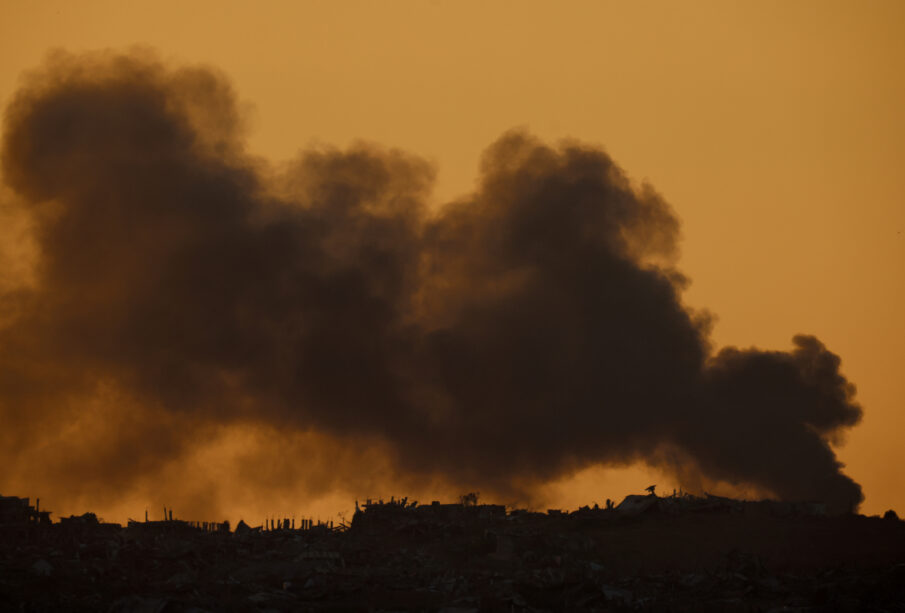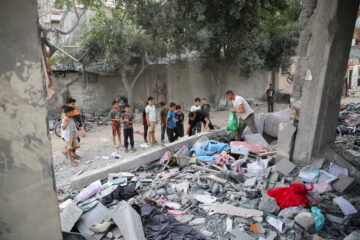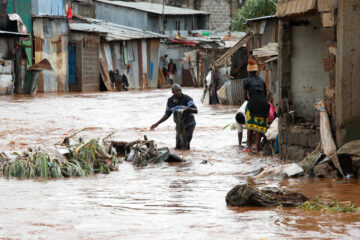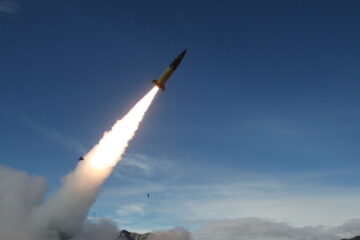Israel intensifies strikes on Gaza’s Rafah, killing large family in home
 Smoke rises over Gaza, amid the ongoing conflict between Israel and the Palestinian Islamist group Hamas, as seen from Israel, February 21, 2024. REUTERS/Susana Vera
Smoke rises over Gaza, amid the ongoing conflict between Israel and the Palestinian Islamist group Hamas, as seen from Israel, February 21, 2024. REUTERS/Susana VeraBy Bassam Masoud, Ibraheem Abu Mustafa and Nidal Al-Mughrabi Reuters
Israel intensified its bombardment of Rafah in Gaza’s south and over a dozen members of one family were killed in an air strike, residents said, as the ruined Palestinian enclave’s health ministry announced 29,313 deaths in the war so far.
In Jerusalem, Israeli war cabinet member Benny Gantz cited “promising early signs of progress” on a new deal to release hostages held by Hamas militants in Gaza amid talks conducted by the United States, Egypt and Qatar to secure a pause in the war.
The Israeli army (IDF) said it had stepped up operations in Khan Younis, a city just north of Rafah. It made no mention of attacks on Rafah itself in its daily summary of events in Gaza and did not immediately respond to a request for comment.
About 1.5 million people are estimated to be crammed into Rafah, on the southernmost fringe of the enclave close to the border with Egypt, most of them having fled their homes further north to escape Israel’s military onslaught.
The flow of aid entering Gaza from Egypt has almost dried up in the past two weeks, and a collapse in security has made it increasingly difficult to distribute the food that does get through, according to U.N. data and officials.
Israel has said it is preparing for a ground assault on Rafah, despite mounting international opposition, including from staunch ally the United States, over fears for civilian lives.00:10Debris and damage in Syria after Israeli missile hits
Rafah residents reached by text message reported several Israeli air strikes and large explosions in the city, as well as naval boats opening fire on beachfront areas.
Reuters video journalists filmed the aftermath of a strike on the home of the Al-Noor family in Rafah, which was reduced to rubble, showing over a dozen bodies wrapped in white or black shrouds and bereaved relatives at a Rafah hospital.
Abdulrahman Juma said his wife Noor, who was from the Al-Noor family, as well as his one-year-old daughter Kinza, had both been killed in the strike, along with Noor’s parents, brother and other relatives.
Juma was holding Kinza’s body, wrapped in a bloodstained white shroud. “This one, who is on my lap, took my soul away … She is one-and-a-half years old,” he said.
Israel says Hamas militants use civilian buildings as cover, something the Islamist group denies.
Local residents also said Israeli tanks had advanced west from Khan Younis into Al-Mawasi, previously an area of relative safety where the army had told Palestinians to seek shelter.
The tanks reached the coastal road, effectively cutting off Khan Younis and Rafah from the rest of the Gaza Strip, though they retreated after a few hours, according to residents.
Gaza’s health ministry said on Wednesday 69,333 people had been injured in Gaza since the start of the war on Oct. 7, in addition to 29,313 deaths, with 118 killed in the past 24 hours.
The war was triggered by Hamas militants who burst over the border into southern Israel on Oct. 7, killing 1,200 people and taking 253 hostage, according to Israeli tallies.
Vowing to destroy Hamas, Israel has responded with an air and ground blitz on Gaza that has displaced most of the population of 2.3 million, caused widespread hunger and laid waste to much of the territory.
HOSTAGE RELEASE TALKS
Gantz told a televised press briefing that efforts were continuing to broker a new hostage release deal and “there are promising early signs of possible progress”.
“We will not stop looking for a way and we will not miss any opportunity to bring our girls and boys home,” he said.
But Gantz warned that if no new deal were struck, the Israeli military would keep fighting in Gaza even into the Muslim holy month of Ramadan, which begins next month.
Weeks of negotiations have failed to yield a breakthrough, with Israel dismissing Hamas’ demand for a halt to the war and Israeli withdrawal from Gaza in exchange for more hostage releases as “delusional”.
During the sole pause in fighting so far, a week-long truce in late November, 110 hostages were freed in exchange for 240 Palestinian prisoners held in Israel.
The humanitarian situation in Gaza is worsening by the day.
The World Food Programme said on Tuesday it had paused deliveries of food aid to northern Gaza after its trucks were attacked by hungry crowds and faced looting and gunfire.
Britain said on Wednesday that Jordan had air-dropped four tonnes of UK-funded aid including medicines, fuel and food to Tal Al-Hawa Hospital in Gaza’s north but that “more aid is needed, and fast”.
ANGER AT UNITED STATES
At the site of the bombed house in Rafah, neighbours and relatives vented their anger at the U.S., which on Tuesday vetoed a draft U.N. Security Council resolution calling for an immediate humanitarian ceasefire in Gaza.
“Since October 7 and until this moment, the U.S. has been supporting Israel with rockets, aircraft and tanks. All of these massacres are because of America,” said Youssef Sheikh Al-Eid, whose brother had been living in the targeted house.
Residents of Deir Al-Balah in central Gaza and Khan Younis also reported overnight strikes and deaths, and multiple funerals were held on Wednesday morning.
The Israeli military said 29 militants were killed in targeted operations in Khan Younis in the past 24 hours.
It said Israeli forces also destroyed a tunnel that stretched over 1 kilometre under Khan Younis and was used by senior Hamas officials and the group’s regional brigade as a hideout and for managing combat operations.










